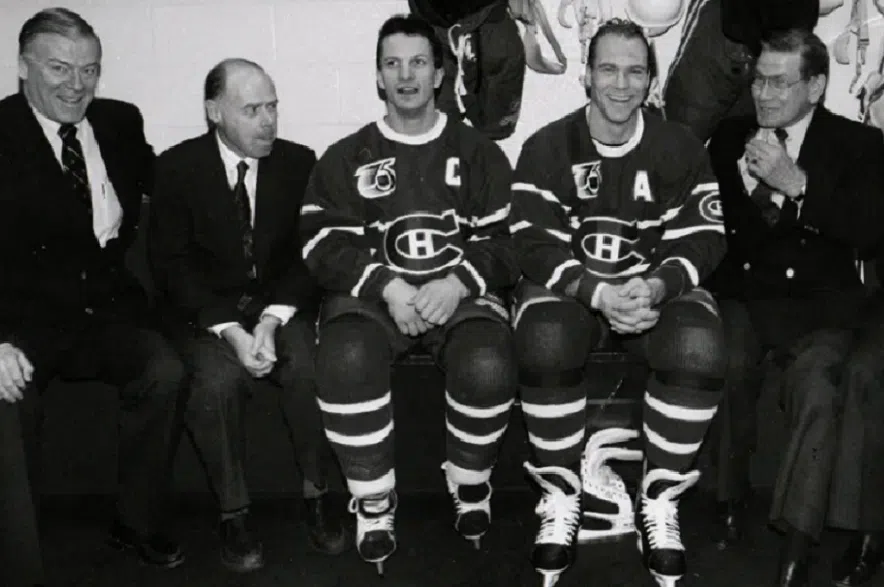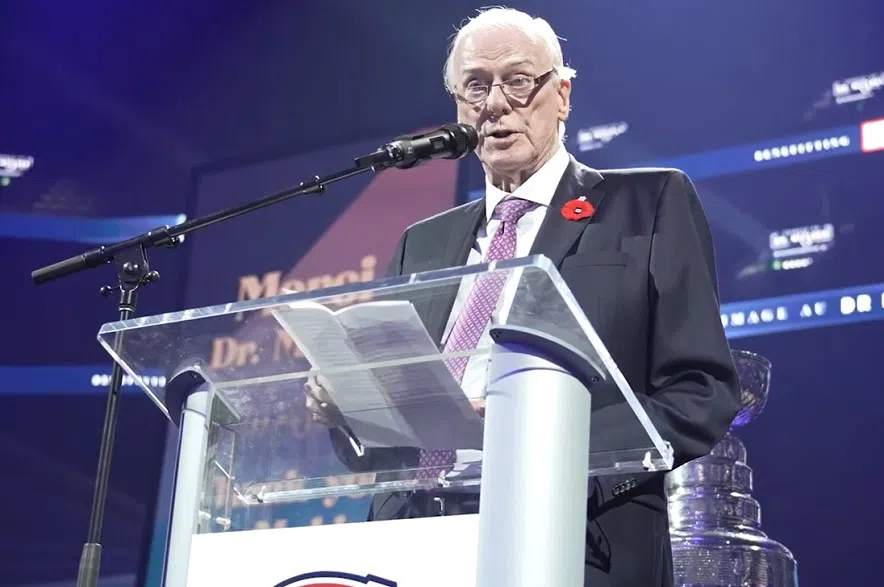A franchise as old and storied as the Montreal Canadians has no shortage of legends.
He may never have scored a goal or put on a jersey for the franchise, but Dr. David Mulder had a front-row seat to many of the team’s greatest triumphs and some of their the most difficult moments.
The 85-year-old Mulder decided in September that the time was right to retire after six decades as the Montreal Canadiens’ doctor.
“I think the most satisfying day of my career was the day that Saku Koivu returned to play after receiving chemotherapy for Hodgkin’s lymphoma. He was such a fighter, ” Mulder recalled during a tribute night in his honour on Nov. 8 in Montreal.

Dr. David Mulder with Canadiens captain Guy Carbonneau, alternate captain Brian Skrudland and the team’s medical staff during the 1991-92 season. (David Mulder/Submited)
“The night he came back, he came to see me and said ‘I’m so grateful to be getting back on the ice.’ He went on the ice and had a standing ovation. It was unforgettable for me.”
Mulder spent most of his adult life in Montreal, but he’s a Saskatchewan boy at heart. He left his hometown of Eston to get his medical degree at the University of Saskatchewan and after graduation his passion for medicine and hockey led him to Montreal.
In 1963 he landed a spot on the medical team for the Canadians’ farm team, and six years later he was promoted to the big leagues. He became the team’s top doctor in 1999.
READ MORE:
- Connor Bedard’s mom says 18-year-old’s NHL debut feels ‘surreal’
- Carbon monoxide poisons players at Wakaw hockey tournament: Mayor
“I’ve always had a real passion for hockey. It was an incredible opportunity to begin looking after the Montreal Junior Canadians,” said Mulder.
The early years of Mulder’s career were spent stitching up cuts on players who didn’t wear helmets and visors. But the thoracic and trauma surgeon quickly built an impressive resume by guiding players through serious knee injuries, concussions and cancer. On a few occasions, his expertise saved lives.
On January 29, 2000, Montreal forward Trent McCleary was nearly killed while blocking a slap shot. The puck hit McCleary in the throat, crushing his larynx.
“He lost his airway and was really near death.” Mulder recalled.
“We got him from the rink to the operating room in 17 minutes, and we’re able to do a tracheotomy and get his breathing under control.”
The safety of players has been a pillar of Mulder’s career, and it’s lesson he was taught by one of the most beloved figures the team’s history.
“(Jean Béliveau) said the cardinal rule for a doctor: always put the player’s health first,” Mulder said. “Never mind about management, the press or the fans. That was a lesson I learned early on, and followed through my entire career.”
While Mulder has given up the medical reigns of the Canadians, his commitment to player safety will have a lasting impact. During his career Mulder was one of the driving forces behind several safety changes by the NHL.
“After the Trent McCleary incident, all of the doctors must sit 25 feet from the ice surface and very close to an emergency clinic,” said Mulder.
“We’ve been very active in trying to change the rules and regulations regarding concussions. I would love to see fighting removed from the NHL, but that’s not a popular opinion,” he added with a chuckle.
Mulder said he is not ready to hang up his stethoscope quite yet, and plans to continue at Montreal General Hospital in a reduced role, training and consulting until the end of next year.
As for retirement plans, he said he will continue going to Canadiens games and make some visits to the family farm near Eston.











